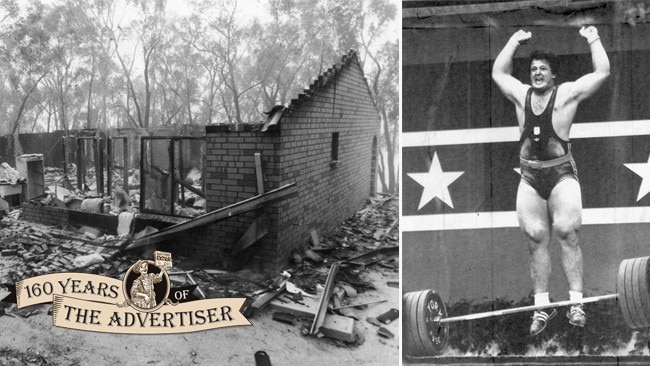David Penberthy: Adelaide in the 1980s
“THE decade stands as our last great period of uninterrupted optimism.” Read David Penberthy’s stirring account of life in South Australia in the 1980s.
FOR those of us who lived through the 1980s in South Australia, the decade stands as our last great period of uninterrupted optimism.
It felt that life in our state was genuinely good, and would remain so forever more.
There were, of course, periods of darkness, none worse than the 1983 Ash Wednesday bushfires.
I remember walking home backwards from school that day, unable to take my eyes off the terrifying black mass spread right across the Adelaide Hills as I headed west across the Mitchell Park footy oval towards home.
Amid all that vast blackness intense pockets of fire glowed red through the galling smoke from many kilometres away. It felt as if life itself was going to end. Horrifically, for 75 people in Victoria and SA, it did.
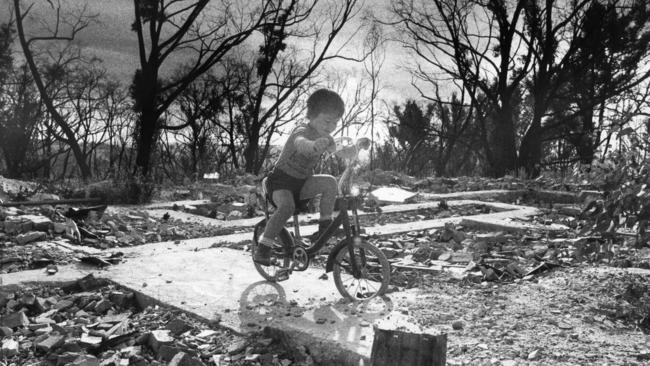
As the then-teenaged son of caring parents, I also strongly recall the deep sense of community unease unleashed by The Family murders.
Barely a day passed without the old afternoon paper The News splashing its front page with a story about the latest disappearance or abduction attempt.
For my generation, this horrible string of crimes defined family conversations at an age when our parents were gradually giving us the freedoms that come with the advent of adulthood.
These two events aside, the 1980s were the last period of unadorned happiness our state has enjoyed.
In these pre-State Bank collapse days, fresh from winning the right to host the Formula One Grand Prix — forever, we believed — it felt like the good times would never end.
I still remember the Sunday night of that first Grand Prix in November 1985.
It was a beautiful sunny day, and my then girlfriend owned a tandem bicycle, and after the race finished we rode into the city and did a lap of the straight before heading down to a jam-packed Rundle St to join the throng. Adelaide was also hitting its cultural straps in the 1980s, with an arts scene that was going from strength to strength with the other states yet to start staging rival Festivals.
The band scene was sensational, with an amazing roster of local bands on the Greasy Pop label.
On any given Sunday you could head into the Austral in Rundle St and watch a band like The Mad Turks playing some of the finest tunes ever penned in SA.
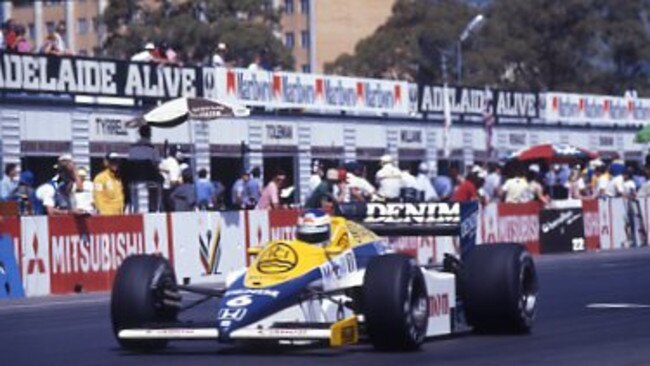
There were more venues then to see bands from interstate and overseas. I have the fondest memories of seeing bands at Le Rox, the Tivoli and the Bridgeway, and distinctly recall how on the night of the Live Aid concert my mates and I cunningly used money donated by our parents for the people of Africa to pay for a cab ride and entry to the Findon Hotel to watch a new band called the Hoodoo Gurus play their album Stoneage Romeos in its entirety. (Don’t worry, we recouped the money later and sent it Bob Geldof’s way.)
Adelaide has had fun since, for sure. But in the wake of the State Bank collapse, the brain drain interstate and the decline in manufacturing, it’s felt like whatever fun we’ve had has been an act of defiance against the woes that have plagued us since.
In Adelaide in the 1980s, fun was simply the normal state of affairs.
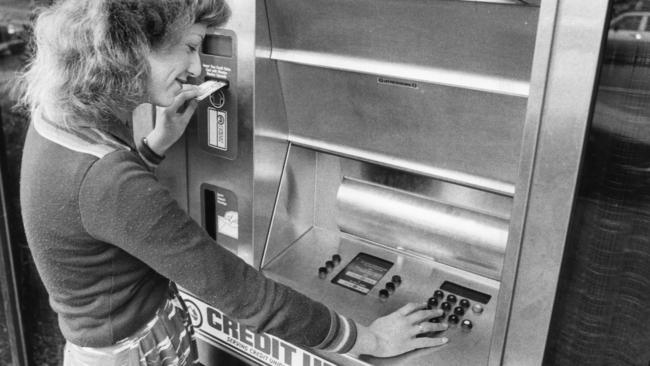
Major news events of the 1980s
1980
■ Australia’s first ‘test-tube’ IVF baby, Candice Reed, born in Melbourne.
■ Baby Azaria Chamberlain missing at Ayers Rock, reported to have been taken by a dingo.
■ ATMs introduced.
■ First Ash Wednesday bushfires in Mount Lofty Ranges.
■ Slogan ‘The Festival State’ introduced for SA vehicle numberplates.
1981
■ UNESCO grants World Heritage Site status to three Australian sites: Kakadu National Park, Willandra Lakes and the Great Barrier Reef.
■ Murray Mouth closes during drought period and is reopened with earthmoving equipment.
■ Caroma develops environmentally friendly dual flush toilet.
1982
■ River Murray Waters Agreement amended so the River Murray Commission can take environmental problems, including water quality issues, into account.
■ Brisbane hosts Commonwealth Games.
■ Point McLeay becomes known as Raukkan.
■ International air services commence through Adelaide Airport at West Beach.
■ Australia’s Community Refugee Settlement Scheme begins when first Indochinese refugees arrive in Whyalla.
1983
■ Australian Labor Party wins the general election and Bob Hawke becomes Prime Minister.
■ Yacht Australia II wins the America’s Cup, breaking an extensive winning streak by US.
■ Commonwealth Sex Discrimination Act passed.
■ Ash Wednesday bushfires in South Australia and Victoria cause loss of 75 lives and destroy 2,500 buildings.
■ Wendy Chapman elected Adelaide’s first woman Lord Mayor.
1984
■ Advance Australia Fair proclaimed Australia’s national anthem
■ Green and gold proclaimed as Australia’s national colours.
■ Medicare (National Health Insurance) established.
■ Royal Commission into British Nuclear Tests in Australia begins hearings.
■ South Australia’s Maralinga Tjarutja Land Rights Act returns land used for atomic weapons testing to traditional owners.
■ Dr Lowitja (Lois) O’Donoghue honoured as Australian of the Year in recognition of ‘her enormous personal contribution in bridging the cultural gap between Aboriginal people and the rest of the Australian Community’.
■ Los Angeles Olympics: heptathlete Glynis Nunn and weightlifter Dean Lukin from South Australia win gold for Australia.
1985
■ Commonwealth transfers freehold title for Ayers Rock and Uluru National Park to Mutijulu Aboriginal community.
■ The Royal Commission on British Atomic Tests at Maralinga condemns Britain for breaching safety standards and recommends compensation.
■ State Government appoints Australia’s first Commissioner for the Ageing.
■ Mary Beasley appointed SA’s Ombudsman, the first woman Ombudsman in Australia.
■ Adelaide Casino opens in section of Adelaide Railway Station building.
■ First Australian Formula One Grand Prix held in Adelaide, won by Keke Rosberg of the Williams team.
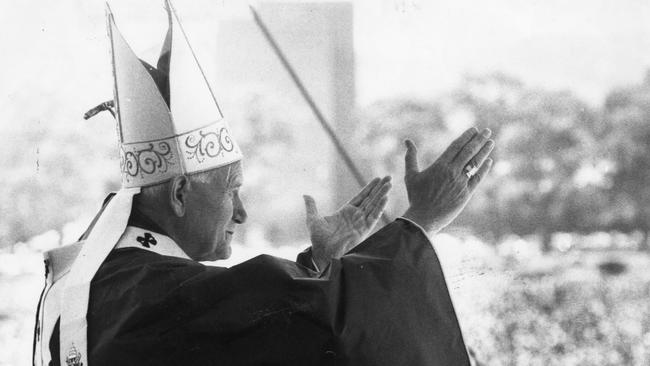
1986
■ The Australia Act makes Australian law fully independent from the British Parliament and legal system.
■ Joan Child becomes first woman Speaker of House of Representatives.
■ Car bomb explodes outside police headquarters in Russell Street, Melbourne.
■ Australia’s population reaches 16 million.
■ Jubilee celebrations commemorate 150th anniversary of European settlement.
■ Anne Levy appointed President of the SA Legislative Council — the first woman to be a Presiding Officer of a House of Parliament in Australia.
■ Pope John Paul II visits the state.
■ First stage of O-Bahn guided busway begins operating.
1987
■ Royal Commission into Aboriginal Deaths in Custody begins.
■ October: Record fall of share prices on Australian Stock Exchange — worst economic crash since 1929.
■ Introduction of mobile telephone networks in Australia.
■ EFTPOS system launched.
■ Building of Botanic Gardens tropical conservatory commences.
■ Adelaide-Darwin all-weather road completed.
■ Multi Function Polis in Adelaide region proposed; project abandoned 1997.
1988
■ Australian Bicentennial celebrations of European settlement.
■ New Parliament House opens in Canberra.
■ Kay Cottee becomes the first woman to sail solo non-stop around the world.
■ Red-light cameras installed at selected traffic sites.
■ East End Market closed; new market at Pooraka.
■ First Opera In The Outback staged near Beltana in the Flinders Ranges.
■ World’s first non-chemical biological pesticide developed at University of Adelaide.
1989
■ Australia’s worst earthquake strikes Newcastle, NSW; 13 die and 150 injured.
■ Migration Legislation Amendment Act 1989 tightens management of the immigration program; includes the introduction of mandatory deportation of people seeking to come to Australia illegally.
■ Wayne Gardner wins the inaugural Australian Motorcycle Grand Prix at Phillip Island.
■ Tandanya National Aboriginal Cultural Institute established in Adelaide: Australia’s first indigenous-owned and managed multi-arts centre.
■ National Crime Authority opened office in Adelaide.
■ Adelaide Women and Children’s Hospital formed by merger of Adelaide Children’s Hospital and Queen Victoria Hospital.

